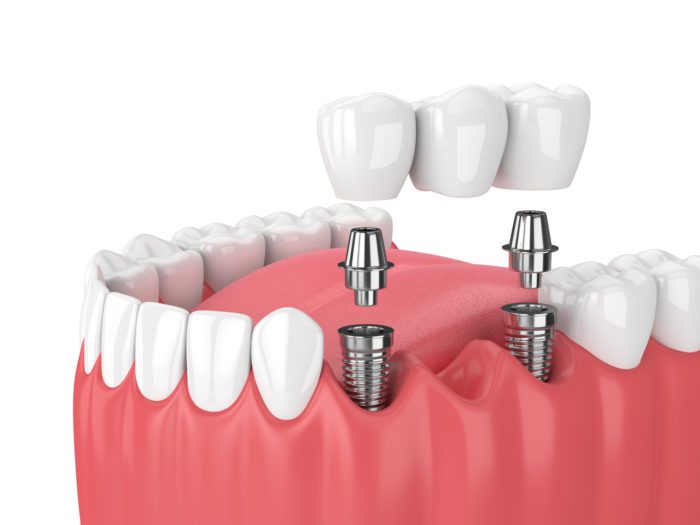How to Spot Complications After Dental Implant Surgery

Strong 8k brings an ultra-HD IPTV experience to your living room and your pocket.
Dental implant surgery is a popular and effective way to restore missing teeth. However, like any surgical procedure, it comes with the potential for complications. While most people recover without issues, it’s important to be aware of the signs that something might be wrong. Early detection of complications can help you seek timely treatment and avoid long-term problems. In this article, we’ll explore how to spot complications after dental implant surgery, the causes, and what steps to take if issues arise.
Understanding Dental Implant Surgery:
Dental Implant Dubai surgery involves placing a titanium post into the jawbone, which serves as a replacement for the tooth root. Over time, the bone fuses with the implant, a process called osseointegration. Once integrated, a crown, bridge, or denture can be placed on the implant, restoring the function and appearance of the missing tooth.
While the procedure has a high success rate, there are risks involved, and complications can occur during the healing process. Complications may arise in the days, weeks, or even months following the surgery.
Common Signs of Complications After Dental Implant Surgery:
After dental implant surgery, it's normal to experience some swelling, bruising, and mild discomfort. However, certain signs and symptoms should not be ignored as they may indicate complications. It’s important to monitor your condition carefully and consult your dentist if any of the following occur:
Severe Pain or Discomfort:
Some pain is expected after the procedure, but if you experience intense pain that doesn’t improve with prescribed painkillers or seems to worsen over time, it may be a sign of infection, nerve damage, or other complications. It’s important to distinguish between normal post-surgical discomfort and pain that signals an issue.
Excessive Swelling or Bruising:
Swelling and bruising are common after dental implant surgery and usually subside within a few days. However, if the swelling continues to increase after the first few days or if it is accompanied by severe bruising, this could indicate a problem such as an infection or an issue with the implant's placement.
Fever and Chills:
A mild fever can sometimes occur after surgery, but if you experience a high fever (above 101°F or 38.3°C) or chills, it may be a sign of infection. Infections after dental implant surgery are rare but can occur if bacteria enter the surgical site. This can lead to an abscess or more severe issues if not treated promptly.
Excessive Bleeding:
Some bleeding is normal immediately following the surgery, but if bleeding doesn’t stop within a few hours or becomes more severe, this could indicate a complication. Bleeding might be due to an issue with the blood vessels, or it could signal a problem with the implant site. Persistent bleeding should be addressed by your dentist immediately.
Implant Mobility:
Once the implant is placed, it should remain stable and integrated into the bone. If you notice that the implant feels loose or moves when touched, this is a serious complication. This could mean that the implant has failed to properly fuse with the jawbone, a condition known as "implant failure," which may require removal and a replacement procedure.
Signs of Infection After Dental Implant Surgery:
Infection is one of the most serious complications that can occur after dental implant surgery. If left untreated, infections can spread to other parts of the body. Here are the signs to watch for:
Pus or Discharge:
A common sign of infection is the presence of pus or a foul-smelling discharge around the implant site. This discharge can be a green or yellowish color and may have a strong odor. It’s important to seek professional care immediately if you notice any discharge from the surgical site.
Redness or Inflammation:
While mild redness and inflammation are normal, significant redness around the implant site or the surrounding gum tissue can indicate an infection. If the gums appear unusually swollen or redder than expected, it’s best to contact your dentist to determine whether an infection is present.
Bad Taste or Odor in the Mouth:
An infection can sometimes cause a persistent bad taste or smell in the mouth, especially near the surgical site. This may be due to the buildup of bacteria or decaying tissue. If you experience an unusual taste or odor, it’s important to follow up with your dentist to rule out an infection.
Bone Loss or Poor Osseointegration:
Successful dental implant surgery depends on the proper fusion between the implant and the jawbone. If this doesn’t happen, the implant may fail. This condition is known as poor osseointegration and can result in bone loss.
Pain Around the Implant Site:
Pain that is localized around the implant site, especially months after the surgery, can indicate that the implant is not properly integrating with the bone. Bone loss can occur if the implant shifts or becomes unstable. If the pain persists or worsens, it’s important to seek advice from your dentist.
X-Ray Evidence of Bone Loss:
Your dentist will monitor the healing process with regular X-rays. If bone loss is detected on these X-rays, it could suggest that the implant is failing to integrate properly. In some cases, bone grafting may be required to restore the bone structure before another implant can be placed.
Nerve Damage and Sensory Changes:
Nerve damage is a rare but serious complication that can occur during dental implant surgery, particularly if the implant is placed near nerves in the lower jaw or upper jaw. Damage to nerves can lead to sensations like numbness or tingling in the lips, tongue, or chin.
Numbness or Tingling:
If you experience numbness, tingling, or a "pins and needles" sensation in the lips, tongue, or chin after the surgery, this could be a sign of nerve damage. In most cases, nerve damage is temporary, but it can also be permanent in some instances. If these sensations persist for more than a few days, it’s important to contact your dentist immediately.
What to Do if You Suspect Complications:
If you notice any of the signs of complications mentioned above, it's crucial to contact your dentist or oral surgeon right away. Early intervention is key to addressing issues before they become more serious. Your dentist will assess the situation and may recommend treatment options such as antibiotics for infection, pain management, or even surgery to address implant failure.
In some cases, the implant may need to be removed, and you may need additional treatments like bone grafting before another implant can be placed.
Conclusion:
Dental implant surgery is a highly effective treatment for missing teeth, but complications can arise during the healing process. By being aware of the signs of complications, such as excessive pain, swelling, infection, and implant failure, you can take steps to address issues early and ensure a successful recovery. Always follow your dentist's post-surgical care instructions, and don't hesitate to seek professional help if you notice anything unusual. Prompt action can help prevent further issues and ensure the long-term success of your dental implants.
Note: IndiBlogHub features both user-submitted and editorial content. We do not verify third-party contributions. Read our Disclaimer and Privacy Policyfor details.







